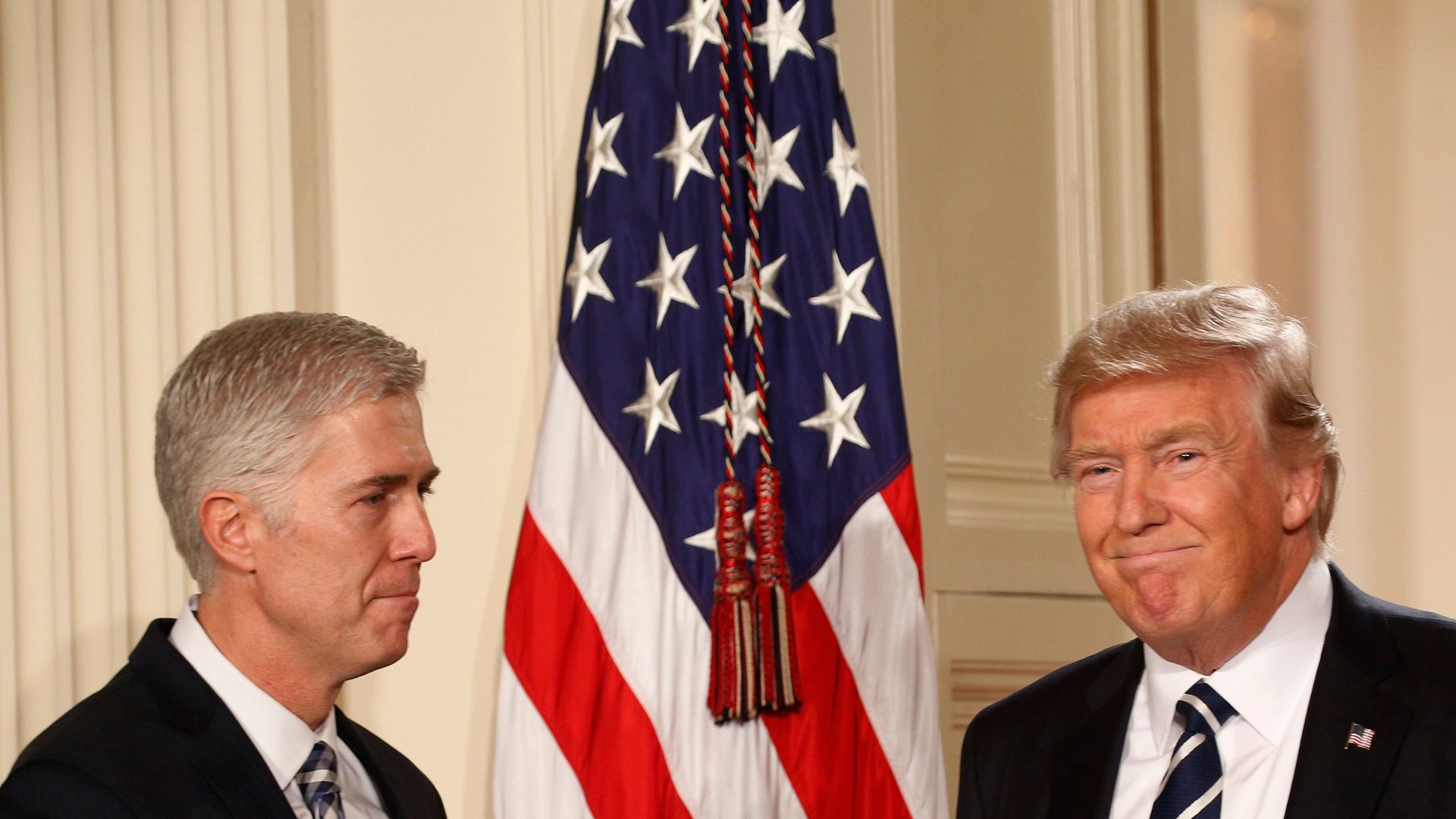Why some Democratic senators are gearing up to block Trump’s ultraconservative Supreme Court pick
United States president Donald Trump has nominated judge Neil Gorsuch to fill the ninth seat on the Supreme Court, left vacant by the death of conservative justice Antonin Scalia in 2016. Gorsuch’s nomination comes after the Republican-dominated Senate refused to evaluate former president Barack Obama’s appointee Merrick Garland, chief judge of the US Court of Appeals for the District of Columbia.


United States president Donald Trump has nominated judge Neil Gorsuch to fill the ninth seat on the Supreme Court, left vacant by the death of conservative justice Antonin Scalia in 2016. Gorsuch’s nomination comes after the Republican-dominated Senate refused to evaluate former president Barack Obama’s appointee Merrick Garland, chief judge of the US Court of Appeals for the District of Columbia.
Gorsuch has sat on the US Court of Appeals for the 10th Circuit—a Denver, Colorado-based federal court which has appellate jurisdiction over Colorado, Kansas, New Mexico, Oklahoma, Utah, and Wyoming—for roughly a decade. And during that time, he has shown himself to be a strict originalist, textualist interpreter of the US Constitution (adherence to the literalism of the document at the time it was written), much in the vein of Scalia, and a proponent of religious exemptions to more progressive policies on same-sex marriage and women’s reproductive rights established during the Obama years.
Given the latter inclination, to many, Gorsuch’s selection is seen as a reward, of sorts, to the Christian right for supporting Trump during the 2016 presidential election.
A key example of Gorsuch’s politics on this front manifested in Hobby Lobby Stores, Inc. v. Sebelius, a 2013 case in which he joined an opinion issued by the 10th Circuit Court of Appeals holding that “closely held family businesses,” like Hobby Lobby arts and craft stores, could not be compelled by federal agencies to provide contraception to employees as part of the Affordable Care Act’s birth control mandate. In his concurrence, he wrote, “It is not for secular courts to rewrite the religious complaint of a faithful adherent, or to decide whether a religious teaching about complicity imposes ‘too much’ moral disapproval on those only ‘indirectly’ assisting wrongful conduct.”
The Supreme Court would eventually side with Hobby Lobby, but Gorsuch remained unsatisfied. He later noted that he would have gone farther than the favorable Supreme Court ruling, permitting not just businesses but individual persons to challenge the birth control mandate.
Gorsuch’s position on this case may pose as a rallying point for liberal legislators aiming to block Trump’s nomination—either for ideological reasons, or as payback for their Republican colleague’s obstruction of the appointment of Merrick Garland. As senate minority leader Chuck Schumer of New York noted yesterday (Jan. 31), senators have the right to demand a 60-vote supermajority by way of a filibuster before confirming a president’s nomination to the court.
Other Democratic senators have since expressed intentions to block the president’s nomination. In a press release published immediately after Trump announced his pick, Oregon’s Ron Wyden said the nomination “represents a breathtaking retreat from the notion that Americans have a fundamental right to constitutional liberties, and harkens back to the days when politicians restricted a people’s rights on a whim.” His fellow Oregonian senator Jeff Merkley added, ““This is a stolen seat. This is the first time a Senate majority has stolen a seat … We will use every lever in our power to stop this.”
Other Democratic senators have added their voices to the choir:
Others have taken a more middle-of-the-road approach. Democratic Montana senator Jon Tester, who is up for (a close) reelection, says he “sitting down with judge Gorsuch, looking him in the eye, asking him tough questions, and finding out if he shares our Montana values.” Newly minted Illinois senator Tammy Duckworth has vowed to do more homework:
Conservatives too are developing strategies for pushing Trump’s various appointments through an uncooperative legislature. Today (Feb. 1), Republican senators suspended Senate rules to confirm two of the president’s cabinet picks in the absence of their Democratic colleagues. The Heritage Foundation, a major right-wing thinktank, has also published a how-to guide on defeating Democratic obstructionism specifically with regards to a Supreme Court nomination—turning centrally on exploiting on Rule XIX (aka, the “two speech rule”)—designed to exhaust and overcome a filibuster.
Texas senator and former Republican presidential candidate Ted Cruz has proposed extending the so-called “nuclear option” (which would require only a simple majority of 51 votes) to Supreme Court nominations. “The Democrats are not going to succeed in filibustering the Supreme Court nominee,” Cruz told CNN’s Jim Acosta Tuesday (Jan. 31). “All procedural options are on the table. The bottom line is we will confirm a strong conservative to replace justice Scalia.”